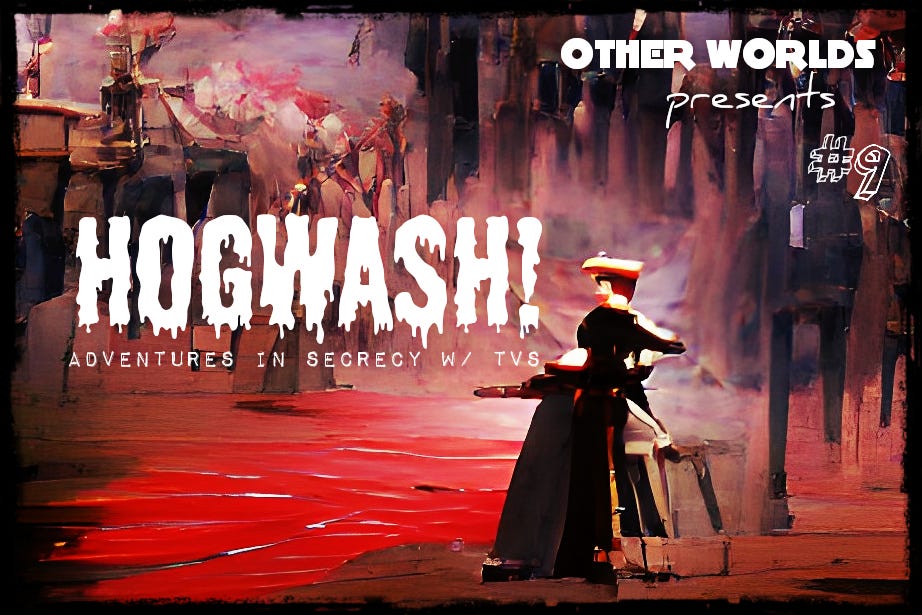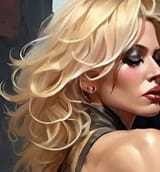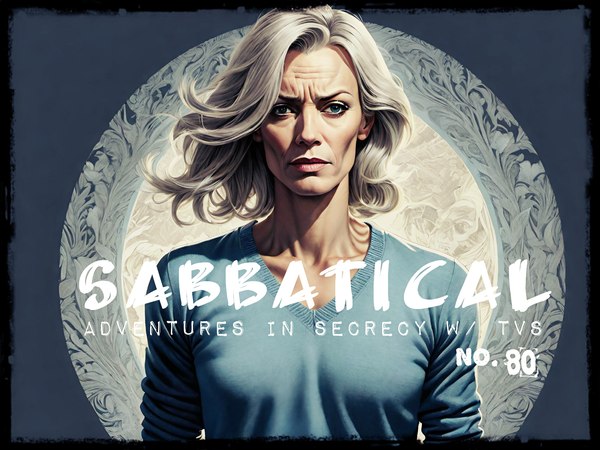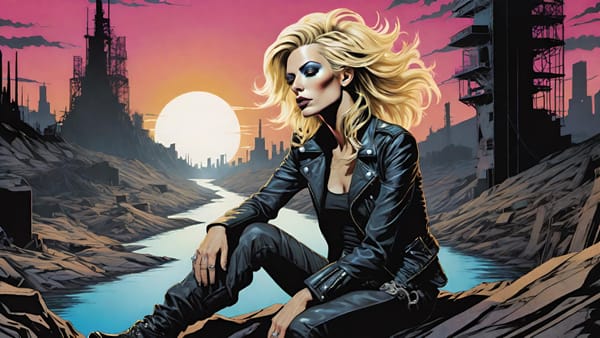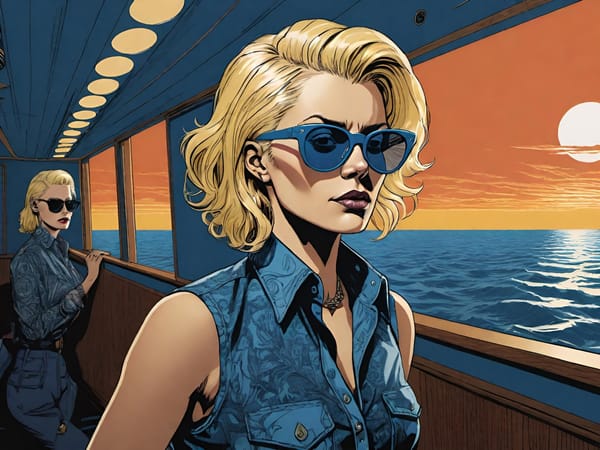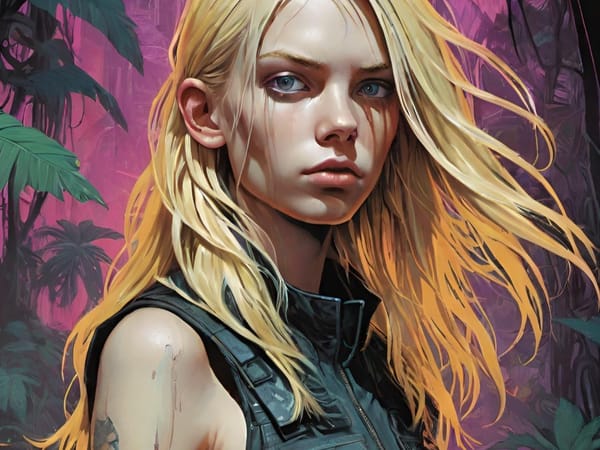Other Worlds Presents: Hogwash!
three
Out on the range, buffalo roamed. Deer and antelope played. No one spoke a discouraging word under the clear, blue skies, luminous clouds giving magnificent lighting and contrast but not overshadowing the township of Monaca.
The air there was pure. Zephyrs rushed freely, breezes light and balmy, around the satin-lined coat of the Hoawoshwogg.
He looked back East, saw the cities shining bright, then took West. West, into Monaca.
Therein, under the beauty of noon sun, stood Dick Hiier, self-attested natural philosopher and aspirant emperor. This town was to be the foundation of a new order, a righteous sorting of the men of quality from the plebians, the glory of Rome made new again in the New World.
The Westward Expansion had, in his mind, failed. As Jefferson before him believed, the Nation should be comprised of independent, excellent men who were not beholden to any interest but their own virtuous, meritorious enterprises, the best of which being small land farms, such men being God’s best and chosen.
But, Dick did not see such yeomen. Rather the land was littered with the weak-minded and afeared. Good neighbors, as they saw themselves, yet lacking meat in their convictions and mettle in their spines, no grist for the ever-turning mill of the Republic.
Dick had said so. Many times, in fact, from the town stump, with a crowd of curious looky-loos turning into a pack of mayhayed charlatans. But one head nodded at the first speech, and two at the second. By fifth, ten heads went up and down, the way Dick Hiier wanted.
The New Romans they called themselves, rather Dick called them, and they agreed, as was their wont, true freethought being above their bend.
Dick Hiier called their vision the Transom West, a vague metaphor that spoke to him as he lay awake at night, sleeping in his father’s barn loft, wondering at its construction, taking in stars and sounds, visioning the Empire to come.
Dick spent his days in the parade of Main Street, talking to folks and handing out his credence, made to press from his father’s largesse, his father being an honest farmer and quiet man of some humble esteem in the Monacan community.
The Hoawoshwogg took no notice of Dick, then, nor Dick of him. Dick extended his literature to the Hoawoshwogg, albeit with a weak wrist that effeminated him in a shameful burning way that he felt in his chest.
The Hoawoshwogg snatched the paper without a thought, and it waved in his hand like a handkerchief as he took the steps of the trading post.
Inside, the proprietor, Randy Hadley, greeted the dandy man in black with jangly spurs and a fine waxed moustache. The Hoawoshwogg tipped the hat, said nothing, and got a shovel from the supply rack.
“That’s a fine implement,” Randy said. “I can see from your dress and accoutrement you are a man of discerning taste and would seek no less than the best we have to offer. Well sir, in your hand is the finest shovel not only in the Township of Monaca, nor the West, but the Union, sir! And it can be yours for the price of ...”
The Hoawoshwogg shot Randy in the chest.
Randy fell over, dead, electricity crackling through his corpse, making him twitch and piss the floor.
In the street, calamity ensued.
The gentle Monacans raised their arms and voices, crisscrossing in the mud, shouting prayers and admonitions and cries for help.
Dick Hiier started, at once taken aback by the uproar and deeply inspired by his own certitude, seeing how correct he had been about his fellows, nay, his lessers.
He rushed to the farmhouse, just north of town. His father tended the pigs, gave little more than an upward glance and loving smile from tired eyes, carried on with his work.
Above the mantle was the Chekhovian rifle, a war prize from his grandfather’s time abroad. Dick seized it with both hands, then gathered the ammunition from the cupboard, loading as he ran.
Dick Hiier’s moment of glory was upon him, and he could feel it. This would be, in the annals of the Transom West, the dawn of the Great New Republic, an Empire of Roman Strength, steel-willed agrarian intellects carving a new sculpture from the rock of history, New Romans dawning to the toll of the church bell ...
Dick was shot.
It took him a moment to realize, and he did to his great fortune before the Hoawoshwogg took notice that Dick was bleeding, electrified, but not dead.
Dick watched from the mud as his fellow New Romans ran like cowards, giving up their credo, only to be shot in the back by the long man in black, a dandy conductor with a baton of death calling out different symphonic voices of wasted humanity.
This ran hot in Dick’s veins. He summoned into him the spirits of Jefferson and Caesar and took to his knee, steadied his grandfather’s rifle against his shoulder. With keen, discerning precision, Dick Hiier took good aim on the Hoawoshwogg. He breathed as his father taught him, let his mind and sight travel the length of the barrel and the distance of closure to the man in black, and exhaled with the crack of the gun.
The Hoawoshwogg was hit. He spun around time and a half, then went down over bended knee, fine suiting splashing the mud in every direction. He lay still, hat far away and red silk interior yawning to the blue sky’s luminous clouds.
A mighty cheer vaulted from the base Dick’s being, and he spit out affirmations of the magnificence of God and the Republic. He ran with vainglory, holding his pop-pop’s rifle high, whooping and wooing and running the lengths of the street. He was soaked in mud and piss, hard-won battle badges. The sight of him, he just knew, was fearsome and noble and brave, and indeed his lessers, nay, his fellows saw him as such, and they, too, whooped and wooed and hollered and clapped, cheering Dick, chanting his name.
“Three cheers for the Republic!” Dick came.
They came out with three cheers.
“Three cheers for Jefferson!”
Three more.
“Three cheers for Caesar!”
Two cheers brought tears to his eyes. He was, at that moment, momentous and monumental. The Julius Caesar-Thomas Jefferson lovechild of his day.
Then he was dead.
The third cheer was overshadowed by the calling electronic crack of the Hoawoshwogg’s fearsome pistola, giving way to gasps, terrified cries, and more cacophonous fretting.
He was badly wounded and weak from it, but the Hoawoshwogg could find a foot. Then the next, though he fell once again. He had the time he needed, for the only one left to kill him was still tending pigs, not yet aware of his oldest son’s early grave.
So in time, the Hoawoshwogg got to his feet and marched to the doctor’s house, killing anyone he cared enough to point at along the way. He took no notice of who they were or how they regarded him.
In the doctor’s house, Dr. Tony Mangold eyed his last patient. The gory wound met its curist, and the doctor saw the fix.
“I don’t suppose you’d let my family live if I fix you up.”
The Hoawoshwogg did not speak. He could not, truly, because the impairment so completely demanded his attention; and, because he could not care less about what the doctor was saying.
Tony did what his heart and mind called him to do, which was to remove the bullet and treat the wound. He was a clever man, so he contemplated installing a slow-release poison in the poultice that would eventually avenge the murder of the town and himself; but, he was too erudite a man, too conflicted within his duty to do no harm or to protect his place to make a fruitful choice before the Hoawoshwogg had shot him dead.
When the Hoawoshwogg took back to the street, he saw Manaford Hiier there, his father’s rifle in opposing grip level with his waist.
What the Hoawoshwogg did not see was Manaford holding his eldest son’s dead body, no tears because he had cried them all before, no fear because he knew death came to all, even him, even his son, even the Hoawoshwogg.
The man in muddied black paused only a moment to drink water from a trough, then shot Dick’s dad dead.
He looked up at the night, what the gentle Moncans regarded as the heavens being bright, the glittering stars winking lights down on the amazed town, citizens gazing at him, wondering at how his glory could exceed their own.
He killed them all, reclaimed his hat and the finest shovel in the Union, and carried on west, along the transom.
